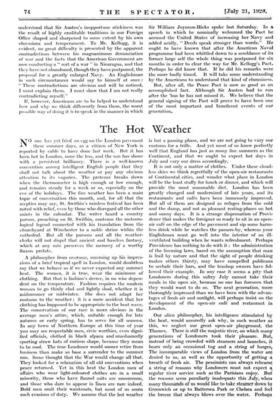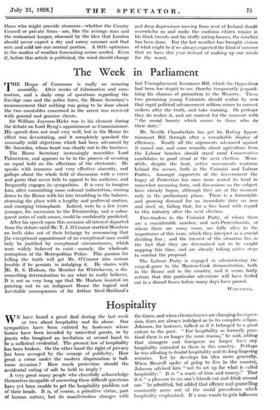The Hot Weather
NO one has yet fried an egg on the London pavement these summer days, as a citizen of New York is reported by cable to have done last week. But it has been hot in London, none the less, and the sun has shone with a persistent brilliancy. There is a well-known convention among intelligent English people that they shall not talk about the weather or pay any obvious attention to its vagaries. The pretence breaks down when the thermometer is high enough or low enough, and remains steady for a week or so, especially on the eve of the holidays. The fine weather has been a main topic of conversation this month, and, for all that the sceptics may say, St. Swithin's rainless festival has been noted with relief, even by those who disregard all the other saints in the calendar. The writer heard a country parson, preaching on St. Swithin, contemn the meteoro- logical legend connected with his translation from the churchyard at Winchester to a noble shrine within the cathedral. But all the parsons and all the weather- clerks will not dispel that ancient and baseless fantasy, which at any rate preserves the memory of a worthy Saxon prelate.
A philosopher from overseas, summing up his impres- sions of a brief tropical spell in London, would doubtless say that we behave as if we never expected any summer heat. The women, it is true, wear the minimum of clothing. But that is fashion's decree, in no wise depen- dent on the temperature. Fashion requires the modern woman to go thinly clad and lightly shod, whether it is midsummer or midwinter. She does not adapt her costume to the weather ; it is a mere accident that her clothing has happened to be appropriate to the heat wave. The conservatism of our race is more obvious in the average man's attire, which, suitable enough for late autumn or early spring, has to serve for all seasons. In any town of Northern Europe at this time of year you may see respectable men, civic worthies, even digni- fied officials, clothed in black alpaca and unashamedly sporting straw hats of curious shape, because they mean to be cool. The true Londoner would sooner retire from business than make so base a surrender to the summer sun. Some thought that the War would change all that. They looked for a relaxation of all old conventions when peace returned. Yet in this heat the London men of affairs who wear light-coloured clothes are in a small minority, those who have flannel suits are uncommon, and those who dare to appear in linen are rare indeed. Bold men omit their waistcoats, but most of us scorn such evasions of duty. We assume that the hot weather is but a passing phase, and we are not going to vary our customs for a trifle. And yet most of us know perfectly well that England has just as many fine summers as the Continent, and that we ought to expect hot days in July and vary our dress accordingly.
It is not only a matter of clothes. Under these cloud- less skies we think regretfully of the open-air restaurants of Continental cities, and wonder what place in London will be the least stuffy for lunch or dinner, and which will provide the most seasonable diet. London has been greatly changed and modernized of late years, and its restaurants and cafés have been immensely improved. But all of them are designed as refuges from the cold and the damp, and not as pleasant resting-places on hot and sunny days. It is a strange dispensation of Provi- dence that makes the foreigner so ready to sit in an open- air cafe on the edge of the pavement and sip some harm- less drink while he watches the passers-by, whereas your Englishman must go well into the interior of an ill- ventilated building when he wants refreshment. Perhaps Providence has nothing to do with it : the administration of the licensing laws, based on the assumption that man is frail by nature and that the sight of people drinking makes others thirsty, may have compelled publicans to seclude their bars, and the teashop owners have fo/- lowed their example. In any case it seems a pity that Londoners during this sultry July cannot take their meals in the open air, because no one has foreseen that they would want to do so. The next generation, more thoroughly impressed than we have been with the advan- tages of fresh air and sunlight, will perhaps insist on the development of the open-air cafe and restaurant in London.
Our alien philosopher, his intelligence stimulated by the heat, would assuredly ask why, in such weather as this, we neglect our great open-air playground, the Thames. There is still the majestic river, on which many generations of Londoners took their pleasure. But instead of being crowded with steamers and launches, it bears only an occasional tug and a string of barges, The incomparable views of London from the water are denied to us, as well as the opportunity of getting a breath of fresh air. The pessimists can always rehearse a string of reasons why Londoners must not expect t regular river service such as the Parisians enjoy. But the reasons seem peculiarly inadequate this July, when many thousands of us would like to take steamer down tq Greenwich or up to Battersea Park or Chelsea and feel the breeze that always blows over the water. Perhaps those who might provide steamers—whether the County Council or private firms—are, like the average man and the restaurant keeper, obsessed by the idea that London should never expect a dry and sunny summer and that rain and cold- arm our normal portion. A little optimism in the matter of weather forecasting seems needed. Even if, before this article is published, the wind should change and deep depressions moving from west of Ireland should overwhelm us and make the cautious citizen rejoice it his thick tweeds and his stuffy eating-houses, the mischief has been done. For the hot weather has brought visions of what might be if we always expected the kind of summer that we have this year instead of making up our minds for the worst.





















































 Previous page
Previous page